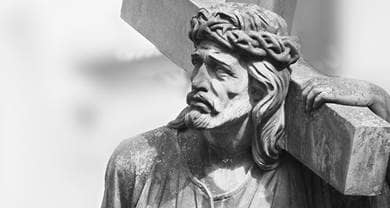- Trending:
- Peace
- |
- Israel
- |
- Faith and Mental Health
- |
- Forgiveness
- |
- Marriage
- |
- Parenting

RELIGION LIBRARY
Christianity
Principles of Moral Thought and Action
In Christian teaching, worship is not limited to Sundays and other important days. All of life should be the worship of God, expressed not only in ritual and prayer, but in how a Christian lives. The Christian is transformed by God's love and is a new person, redeemed by Christ and restored to God. The highest expression of that transformation is found in acts of love toward others, or love of neighbor.
 In the Gospel of Matthew, an expert in the Torah asks Jesus, "Teacher, which is the greatest commandment in the Law?" In his reply, Jesus cites two commandments. The "first and greatest" of these is to "Love the Lord your God with all your heart and with all your soul and with all your mind." This is a quote from Deuteronomy 6:5, a passage found in the Torah. The second "greatest" commandment is to "Love your neighbor as yourself," also found in the Torah, in Leviticus 19:18. Not only did he isolate these as the two most important commandments in the Torah, Jesus added that "All the Law and the Prophets hang on these two commandments" (Matthew 22:36-40).
In the Gospel of Matthew, an expert in the Torah asks Jesus, "Teacher, which is the greatest commandment in the Law?" In his reply, Jesus cites two commandments. The "first and greatest" of these is to "Love the Lord your God with all your heart and with all your soul and with all your mind." This is a quote from Deuteronomy 6:5, a passage found in the Torah. The second "greatest" commandment is to "Love your neighbor as yourself," also found in the Torah, in Leviticus 19:18. Not only did he isolate these as the two most important commandments in the Torah, Jesus added that "All the Law and the Prophets hang on these two commandments" (Matthew 22:36-40).
Jews viewed the Torah as a gift from God, so Jesus naturally referred to the Torah to provide guidance in loving God and neighbor. Being devout Jews, the first Christians followed Jesus' example, turning to the Torah as their guide for understanding how love works in real life. Christians view the Ten Commandments, found in Exodus 20, as the ideal guide to living the life that God intends.
 The first four commandments guide Christians on how to love God, and the last six guide Christians on how to love others. These ten simple rules form the basic guide, given by God, to the full expression of Christian love. In the Sermon on the Mount (Matthew 5-7), Jesus addresses several of these commandments and intensifies their application. For example, he not only forbids murder, he calls his followers to recognize that unresolved anger also destroys others. He not only forbids adultery, but calls his followers to purity of mind and heart.
The first four commandments guide Christians on how to love God, and the last six guide Christians on how to love others. These ten simple rules form the basic guide, given by God, to the full expression of Christian love. In the Sermon on the Mount (Matthew 5-7), Jesus addresses several of these commandments and intensifies their application. For example, he not only forbids murder, he calls his followers to recognize that unresolved anger also destroys others. He not only forbids adultery, but calls his followers to purity of mind and heart.
| New Testament Epistles (many scholars doubt whether Paul wrote the bracketed letters) |
|
| Letters of Paul | Romans, 1 Corinthians, 2 Corinthians, Galatians, [Ephesians], Philippians, [Colossians], 1 Thessalonians, [2 Thessalonians], [1 Timothy], [2 Timothy], [Titus], Philemon |
| Other Letters | Hebrews, James, 1 Peter, 2 Peter, 1 John, 2 John, 3 John, Jude |
| Apocalypse | Revelation |
However, various interpretations of these rules by the churches have imbued these rules with a challenging complexity. The Bible's language does not always adapt to changing circumstances in order to provide clear direction for living a life of love. Aware of this limitation, the apostle Paul placed great stress on faith and freedom in his epistles. Love, taught Paul, is not coerced by laws, but is freely given. The influential theologian Augustine wrote, "Love, and do what you will . . . Let love's root be within you, and from that root nothing but good can spring." If one is transformed by God's love, and loves God in return, then he or she will always find the best way to love others as well.
In practice, Christians do not always agree about the best way to live according to these two commandments that Jesus called the greatest. While Christians agree on the value and dignity of human life, labor, and happiness, questions related to war, sexuality, wealth, and the sacraments have troubled Christians from the earliest days of the Church. Contemporary Christians passionately disagree over questions related to sexuality, such as the ordination of women, birth control, premarital sex, and the marriage and ordination of homosexuals. While changes in society will continue to present painful ethical dilemmas to the churches, the daily expression of charity and love remains an important aspect of Christian life and worship.
Study Questions:
1. Why could it be said that Jesus upheld twelve commandments instead of ten? What are the additional two?
2. How did Jesus expand on the traditional Torah understanding of the Ten Commandments?
3. What do Paul's epistles reveal about Christian morality?
4. What contemporary questions of moral action were present at the Church's inception? Why have these questions remained unanswerable?










